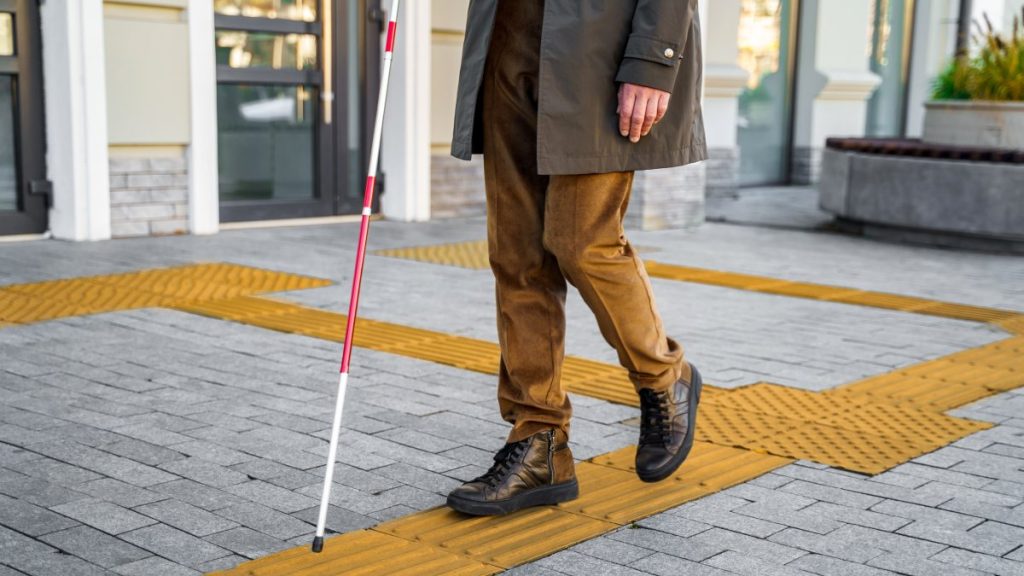Visually impaired individuals living in Istanbul are facing daily difficulties caused by inaccessible infrastructure and widespread social prejudice, particularly in densely populated districts such as Kadıköy, according to testimonies shared during the 10-16 May Disability Week.
Adem Sevindik, a 45-year-old public hospital employee who lost his eyesight due to meningitis at 6 months old, highlighted numerous obstacles that make urban life difficult for visually impaired residents. He explained that physical barriers like sidewalk obstructions, randomly parked scooters and items placed by shopkeepers on walkways significantly hinder their mobility. “We constantly deal with hazards like bollards on the sidewalk and scooters parked in the middle of the road,” he said. “Vehicles, motorcycles and even chairs and tables are often left on tactile paving meant to guide us.”
Sevindik emphasized that accessibility is still a major unresolved issue. He also criticized society’s low level of awareness, saying that people often walk while staring at their phones or tablets and end up bumping into him. “When someone hits us, both parties get hurt. My cane often breaks, and those canes are expensive. It may look simple, but it’s not.”
He also touched on recent policy changes affecting the rights of persons with disabilities. Noting the reduction in the special tax exemption threshold for purchasing vehicles, Sevindik said, “We can’t buy any vehicle we want anymore. Yes, there should be regulations to prevent abuse, but they shouldn’t come at the expense of our rights.”
Addressing social stigma, Sevindik shared that many people react negatively when they see a person with a disability. “We hear people say, ‘Oh God, don’t give us that fate.’ It used to upset me, but now I feel sorry for them. We earn our livelihood. I’ve been a civil servant for 24 years, and my wife, who is also visually impaired, works too. We live a happy life, and we’re thankful.”
Sevindik, who is also a father of two, said he often visits his children’s school to raise awareness and counter prejudice. “People should do their research and not be judgmental. We are not asking for much – just not to be ignored. Everyone is a potential candidate for disability,” he said.
He emphasized that his response to those who harm them, whether intentionally or accidentally, has always been measured and compassionate. “I never wish the same on anyone. But I do say: please don’t ignore us,” he stated.
“We are joyful, happy people. If someone feels down, they should come and see how we live. Let them join us for tea at our association. I invite everyone who helps me to visit, and many stay in touch. I even ended up being the best man at the weddings of two people I met on the street. When we express ourselves, good things happen.”
Fatih Karadayı, vice president of the Association of the Visually Impaired of Türkiye, also shared his concerns, stressing that the biggest problem begins in people’s minds. He noted the absence of protective barriers in metro and tram systems, which can be fatal for visually impaired commuters.
He recalled a tragic incident in 2021 when a visually impaired individual fell onto the tracks in Ankara and lost their life. “As an association, we organized a campaign titled ‘We Don’t Want to Die on the Tracks’ and ran awareness initiatives, but unfortunately, there were no significant results,” Karadayı said.
Karadayı, whose wife is also visually impaired and works as a guidance counselor, spoke about everyday situations shaped by ignorance and prejudice. He described how his wife was once given change by a cashier through their 3-year-old child at a store. More recently, a security guard asked his daughter, “Did you take your dad out for a walk?” while they were boarding a bus. “This type of mindset begins with a lack of knowledge and affects decision-making at every level,” he added.
He also criticized the state of the city’s infrastructure, saying that streets are not designed with the needs of disabled citizens in mind. “Even in metropolitan areas, we encounter random potholes, scooters blocking our path and other hazards. Despite the enactment of accessibility laws in 2005, we’ve made very little progress.”


